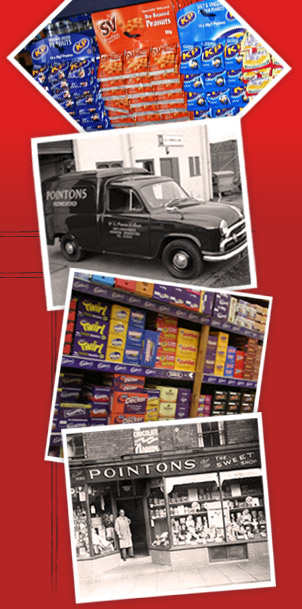The founder of the company, William Henry Pointon arrived in Hednesford from Tipton around 1875 with his wife, Julia, who had been born in Codsall. He was a coal miner and like so many others came to take advantage of the new coalfield and its prospects. However, while still working in the mines he recognised a possible outlet for one of his hobbies – sweet making. (Lots of families made their own goodies.) Sometime before the 1881 Census he had moved into premises on the Cannock Road and there set up his business in buildings at the rear of his home. At one side of the factory, he made sweets and at the other end, he carved wood, another of his trades. In the beginning the sweets were sold on a stall in the Hednesford Market, but by 1890 he had opened up the shop on Cannock Road where the business was to remain until the 1980’s, though the market stall was kept for quite some years. The hundredth anniversary of the firm was held at the shop in Cannock Road.
In 1917, the shop was taken over by William Ernest Pointon who ran it until 1947 when his son, Bertram, took over. However, Ernest’s wife, Eleanor, remained in partnership with her son, Bertram, and her other son, William John, until well into her nineties. Finally, the firm was taken over by the fourth generation in the 1980’s though Nita, Bertram’s wife, still plays a very active part.
In an interview given to Shugborough in 1967, Bertram described his days as a young lad in the factory and later the shop. From Monday to Friday, he started work at 8.00 a.m. and finished at 7.30 p.m. while on a Saturday the hours were from 7.30 a.m. to 9.00 p.m. If he worked hard his grandfather gave him a penny for “being a good lad” and another penny if he took his spoonful of oil every week. (Remember a penny bought quite a lot in the 1920’s.)
Gradually the business expanded and William bought sweet rollers and machines to mass produce the confectionery. At its height, there were 60 sweet rollers and 15 machines. Besides those, there were 5 copper boilers which operated on average two days per week and made around 7 hundred weight of sweets, though in full production between 3 and 7 hundred weight could have been made per day.
Once the mixture was boiled and then rapidly cooled, it was turned out on to a marble slab where it was kneaded. At that point, the flavouring was added. The process took twenty minutes to boil the mixture and fifteen minutes to create the sweets. It was kneaded for around six to seven minutes until it reached a manageable temperature. From there on man handled the mixture on the marble slab while another operated the sweet rolling machine.
Like most sweets of today, there were always the popular varieties and best sellers. Horehounds and Pointon’s Pink Ones were the favourites and made every week. Horehound or hoarhound was a downy herbaceous plant with small white flowers and contained a bitter juice tasting like cough medicine (chemists often sold a tincture of horehound). William grew the plant on his allotment beside the railway line and in his own garden. It was harvested, dried out, and then infused when needed for the sweet making. Four pints of the herbal mixture were added to forty pounds of the sweet mixture. Pink Ones were made with capsicum and aniseed flavourings. Other popular brands included cough sweets, sweet fish, pear drops, and sugar pigs.
The flavours which could not be found locally were obtained from Bushes of London, thought it obviously made the finished product more expensive. For example, aniseed in the 1930’s cost 7 shillings per one pound jar. (At one time, a lot of flavourings were by-products from coal, but the government eventually made that illegal.) The white and brown sugar was purchased from Tate and Lyle’s, “Tate’s Farths” being the nickname for the brown sugar for making the cough sweets and humbugs. In the 1930’s sugar cost 28 shillings per hundred weight and was delivered in 8 hundred weight bacon casks packed into 2 hundred weight bags.
Eventually in 1954/55, because of the expense, Pointon’s stopped making their own and the business became purely a wholesale one which it still is today, trading just off the Rugeley Road. Locals still refer to the firm as “Sucky Pointon’s”, “suck” being the old Hednesford word for sweets.
© A History of Hednesford and Surrounding Villages by Anthony Hunt

